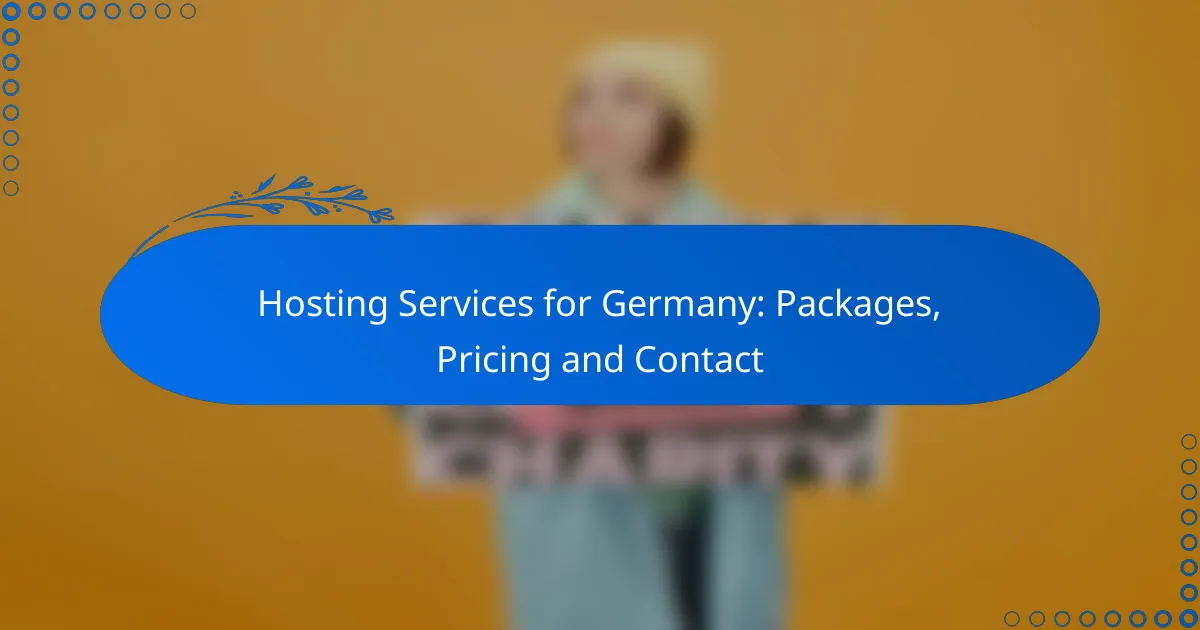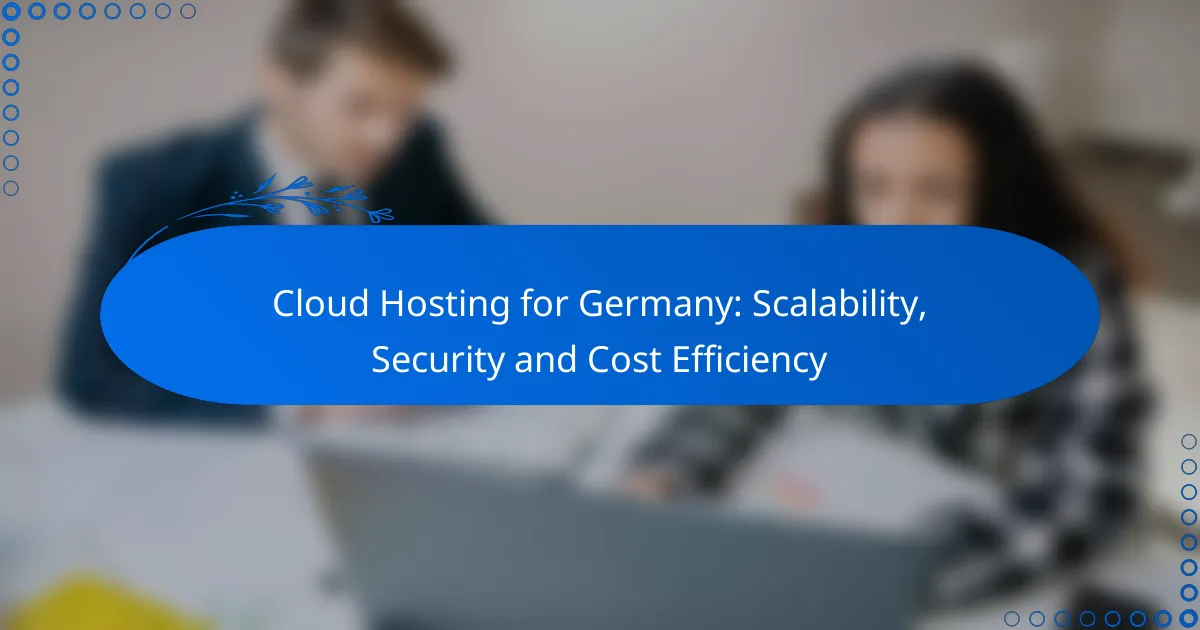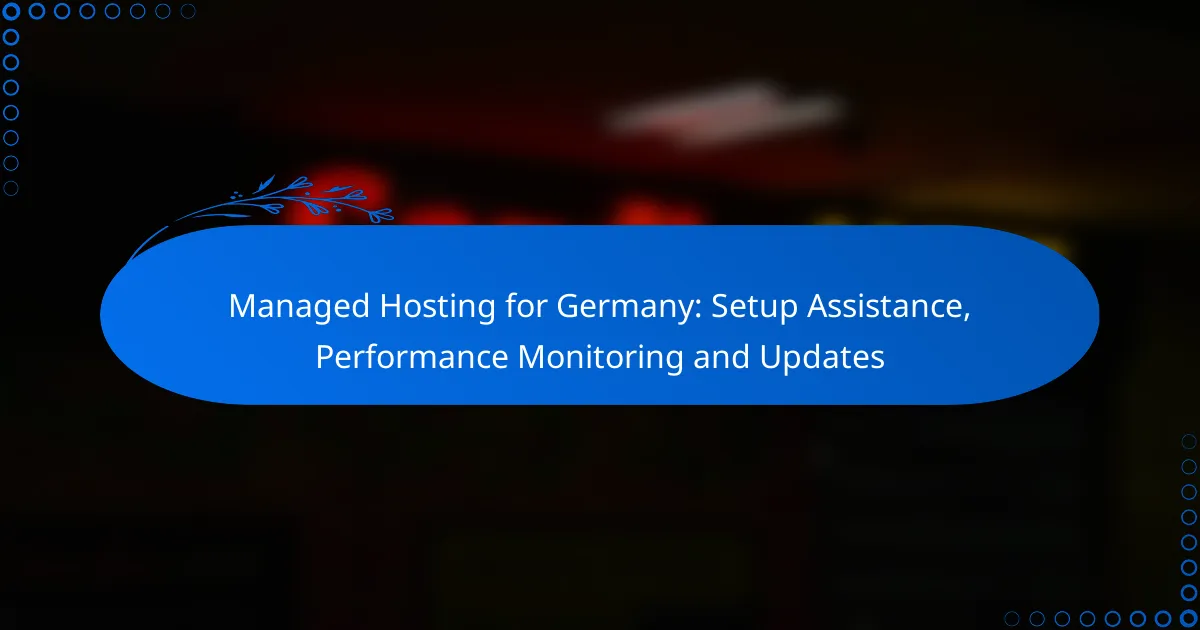Germany offers a wide range of hosting services, catering to various needs from startups to large enterprises. Key considerations include uptime guarantees, pricing structures, and customer support options. Understanding your specific requirements will help you choose the right package, whether it’s shared, VPS, or dedicated hosting. Explore the diverse offerings to find the best fit for your website’s needs.
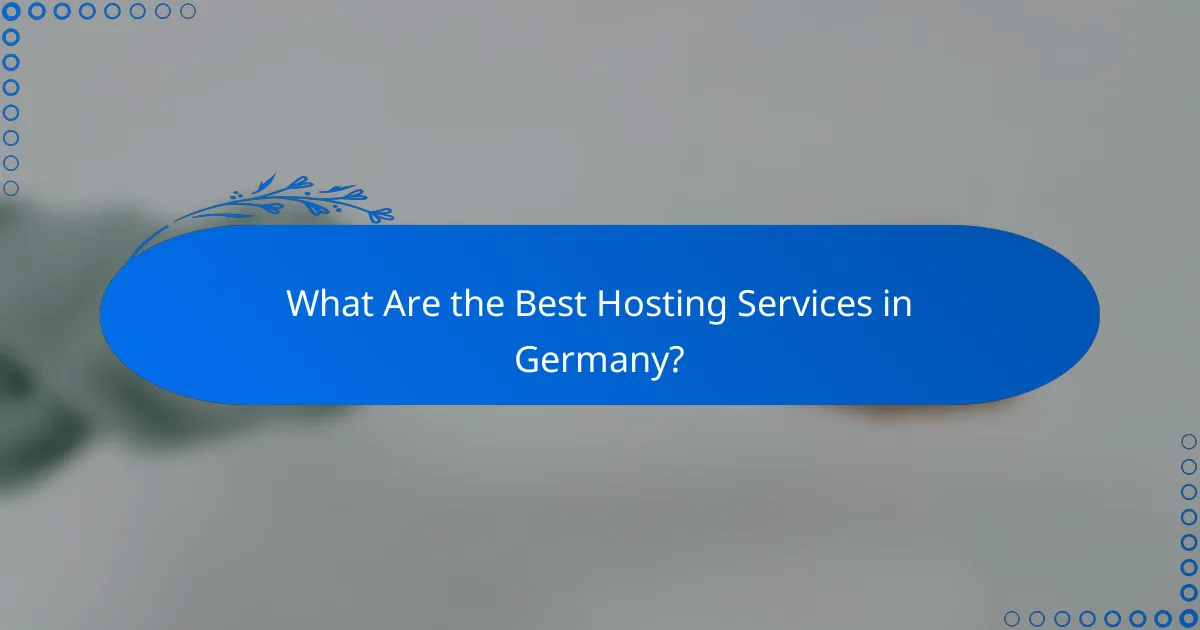
What Are the Best Hosting Services in Germany?
Germany boasts a diverse array of reliable hosting services, with over 100 providers vying for attention. Options range from shared hosting, perfect for startups, to dedicated servers for large enterprises, ensuring that both businesses and individuals can find the right fit.
Choosing the right hosting provider can greatly influence website performance and security. Research indicates that a mere 1-second delay in loading time can decrease conversions by 7%. Key factors to consider include uptime—ideally 99.9% or higher—customer support response times, and pricing structures.
Here are some of the top hosting services in Germany, each offering unique features and benefits. Familiarizing yourself with these options can empower you to make an informed choice tailored to your website’s specific needs.
1&1 IONOS Hosting
1&1 IONOS stands out as a leading hosting provider in Germany, serving over 8 million customers worldwide. It offers a range of packages, including shared, VPS, and dedicated hosting, catering to various customer requirements.
With a user-friendly control panel, 24/7 customer support averaging under 5 minutes response time, and a 30-day money-back guarantee, 1&1 IONOS ensures a smooth user experience. Their competitive pricing, starting at just €1 per month for shared hosting, makes it an appealing choice for small to medium-sized businesses.
Choosing 1&1 IONOS means accessing reliable uptime and scalable resources, essential for growing websites. Their emphasis on security, featuring DDoS protection and SSL certificates, safeguards sensitive data, solidifying their position in the German market.
Host Europe
Host Europe is another respected hosting service in Germany, providing a spectrum of solutions from shared hosting to cloud services, with over 200,000 customers depending on their infrastructure. Their packages cater to both individuals and businesses.
They offer features like free SSL certificates, daily backups, and an intuitive interface, crucial for those new to website management. Host Europe prioritizes customer support, providing multiple channels for assistance, including live chat and phone support.
Choosing Host Europe means benefiting from strong data protection policies that comply with GDPR regulations, ensuring responsible data handling—particularly vital for businesses operating in Europe.
SiteGround
SiteGround is celebrated for its outstanding customer service and high-performance hosting solutions, boasting an impressive 99.99% uptime guarantee. While based in Bulgaria, it has a strong presence in Germany, offering localized services tailored to the market.
The hosting plans include shared, cloud, and dedicated options, all optimized for speed and security, with loading times averaging under 600 milliseconds. SiteGround also provides free daily backups and advanced caching options to enhance website performance, crucial for user engagement.
Opting for SiteGround can lead to faster loading times and improved reliability, both essential for user experience and SEO rankings. Their commitment to customer satisfaction is reflected in high ratings, often exceeding 4.8 out of 5 stars across various review platforms.
OVHcloud
OVHcloud is a global hosting provider with a significant presence in Germany, offering a wide range of hosting solutions, including over 30 data centers worldwide. Their services encompass VPS to dedicated servers, catering to various business sizes and needs.
Known for competitive pricing, with plans starting at €3.49 per month, and an extensive data center network, OVHcloud ensures low latency and high availability. They also offer customizable solutions tailored to specific business requirements, allowing for configurations based on traffic and performance demands.
Selecting OVHcloud provides businesses with flexible scaling options and robust security measures, including firewalls and anti-DDoS protection. This adaptability is particularly beneficial for companies anticipating growth or fluctuating traffic levels.
GoDaddy Germany
GoDaddy is a well-established name in the hosting industry, and its German branch offers a variety of services, serving over 20 million customers globally. From domain registration to shared and VPS hosting, GoDaddy caters to a wide audience with diverse needs.
The platform is user-friendly, making it easy for beginners to set up their websites, with over 1,500 templates available for quick deployment. GoDaddy also provides 24/7 customer support and a suite of additional services like website builders and online marketing tools to enhance visibility.
Choosing GoDaddy Germany simplifies the process of establishing an online presence, with plans starting at just €1.99 for the first year. Their extensive resources and tools empower users to effectively manage and grow their websites, positioning them well in the competitive German hosting landscape.
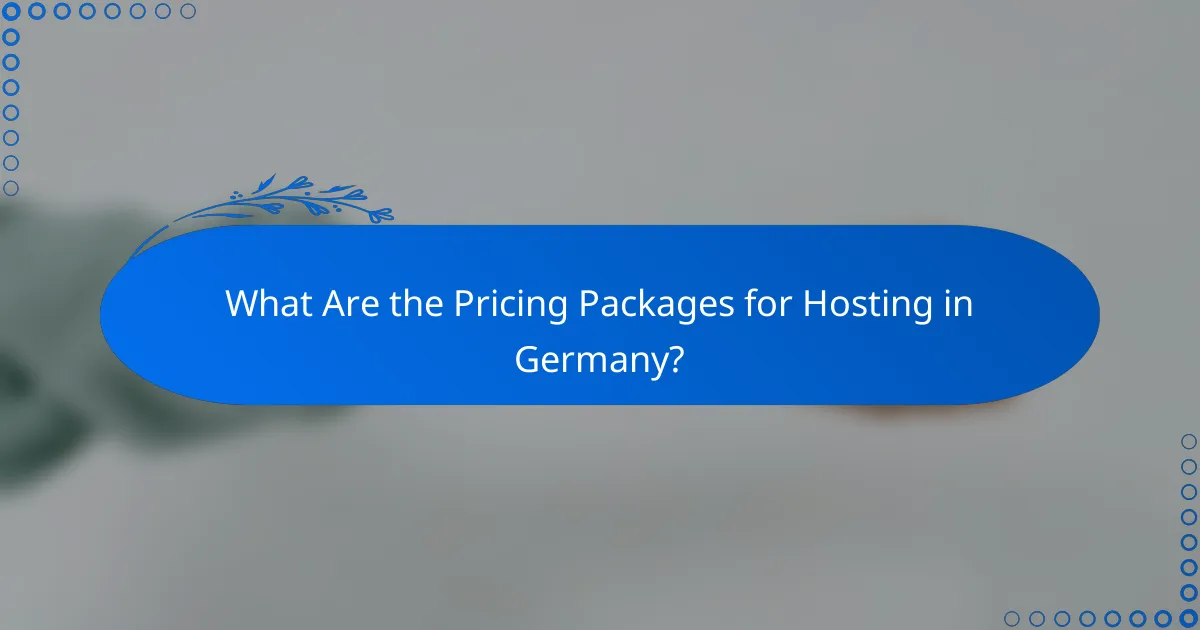
What Are the Pricing Packages for Hosting in Germany?
Germany provides a wide range of hosting packages tailored to different needs and budgets, including shared hosting, VPS hosting, dedicated servers, and cloud hosting. Each option features its own pricing structure and distinct characteristics, catering to everyone from individuals to startups and established businesses.
Grasping the pricing packages is crucial for choosing the right hosting solution. Factors such as storage capacity, bandwidth limits, and customer support levels greatly influence the overall cost. By carefully assessing these aspects, users can make informed choices that fit their specific needs and budget constraints.
Additionally, many hosting providers in Germany regularly offer promotional discounts and flexible billing options, which can significantly affect the total cost over time. Comparing various hosting services is wise to find the best value for your investment, ensuring you get the most out of your hosting budget.
Shared Hosting Packages
Shared hosting is an economical option where multiple websites share a single server, making it ideal for small businesses and personal sites due to its affordability. Prices for shared hosting typically range from €2 to €10 per month, depending on the provider and included features like domain registration and SSL certificates.
Common features of shared hosting packages often include limited storage (around 10 GB) and bandwidth (approximately 100 GB), along with basic customer support. Users should assess their website’s expected traffic and resource needs to choose a plan that accommodates future growth.
While shared hosting is cost-effective, it may not suit high-traffic websites, as shared resources can slow performance during peak times. Therefore, users should consider their website’s growth potential when selecting a shared hosting package to ensure long-term viability.
VPS Hosting Pricing
VPS (Virtual Private Server) hosting provides more resources and control compared to shared hosting, making it ideal for medium-sized businesses or websites with higher traffic volumes. VPS hosting prices generally range from €20 to €100 per month, depending on specifications and performance requirements.
With VPS hosting, users benefit from dedicated resources, including CPU, RAM, and storage, which can significantly boost website performance. For instance, a typical VPS package might offer 2 GB of RAM and 50 GB of SSD storage, allowing for greater customization and efficiency compared to shared hosting.
Moreover, VPS hosting enhances security and isolation from other users, which is crucial for businesses handling sensitive data. Consequently, investing in VPS hosting can improve performance and security for growing websites, making it an appealing option for those looking to scale.
Dedicated Server Costs
Dedicated servers provide the highest level of performance and control, as users have an entire server dedicated to their needs. This option is particularly suited for large businesses or high-traffic websites, with prices for dedicated servers in Germany typically ranging from €80 to €300 per month, depending on hardware specifications.
Dedicated server packages often feature customizable hardware configurations, allowing users to choose their preferred CPU, RAM, and storage options. For example, a dedicated server might include 16 GB of RAM and 1 TB of storage, offering the flexibility necessary for optimal performance tailored to specific business requirements.
While dedicated servers come with higher costs, they deliver unmatched reliability and speed, making them a vital investment for businesses that require consistent uptime and rapid load times. Additionally, dedicated servers often include advanced security features, ensuring the protection of sensitive information against potential threats.
Cloud Hosting Rates
Cloud hosting is a highly scalable solution that allows users to pay only for the resources they consume, making it suitable for businesses of all sizes. Cloud hosting rates in Germany typically start at around €10 per month and can increase based on usage, providing flexibility that aligns with diverse business needs.
With cloud hosting, resources are distributed across multiple servers, ensuring high availability and reliability. For instance, a cloud hosting package may offer automatic scaling, enabling websites to seamlessly manage traffic spikes, which is particularly beneficial for e-commerce sites during peak shopping seasons.
Furthermore, cloud hosting often includes features like automated data backups and enhanced security measures, allowing users to manage their resources easily through an intuitive dashboard. This blend of performance and flexibility makes cloud hosting an appealing choice for businesses seeking robust hosting solutions that can adapt to their evolving needs.

How to Choose the Right Hosting Package in Germany?
Selecting the right hosting package in Germany hinges on understanding your specific needs. Consider the type of website you’re building—whether it’s a personal blog, an e-commerce site, or a business platform—since each category has unique requirements for resources, security, and scalability. For instance, a personal blog may need just 1-2 GB of storage and minimal bandwidth, while an online store could demand over 10 GB of storage, robust security features, and a guaranteed uptime of 99.9% to maintain customer trust. Evaluating these factors will guide you in choosing a package that aligns with your project goals, as overlooking them can lead to performance issues or unexpected costs.
Additionally, assess your technical expertise when selecting a hosting solution. If you lack technical skills, a managed hosting service might be more suitable. This option typically includes server management, allowing you to focus on content creation rather than troubleshooting. While managed solutions often come at a higher price, they can save you time and reduce stress, making them a worthwhile investment for non-technical users.
Finally, think about your future growth potential. Choosing a scalable hosting solution can spare you the headaches of migrating to a new provider as your website expands. For example, a cloud hosting package lets you easily increase resources like bandwidth and storage as your traffic grows, ensuring your website remains responsive and efficient.
Understanding your hosting needs is crucial for selecting the right package. Start by identifying the primary purpose of your website. Are you launching a simple portfolio, or do you need a complex e-commerce platform? Each scenario requires different resources; for instance, a portfolio site may only need basic features, while an e-commerce site typically demands advanced functionalities like payment gateways and inventory management.
Next, evaluate your expected traffic. A website anticipating high traffic—over 1,000 visitors per day—will need significantly more bandwidth and storage than a personal blog with fewer than 100 daily visitors. Utilizing analytics tools can help you forecast your traffic growth, enabling you to choose a package that accommodates future demands without sacrificing performance.
Finally, consider your budget. Hosting packages can range from as low as €2 per month for basic shared hosting to over €100 for dedicated servers. Finding a balance between cost and features is essential; a clear budget will help you narrow down your options effectively while ensuring you invest in a package that meets your needs without overspending.
When comparing hosting packages, focus on key features that align with your specific requirements. Essential elements include storage capacity, bandwidth, and server uptime guarantees, which are critical for maintaining your website’s performance and reliability. For example, a hosting provider that offers at least 50 GB of storage and 1 TB of bandwidth is often suitable for medium-sized websites.
Security features are equally vital. Ensure your chosen hosting provider offers robust security measures, including SSL certificates, firewalls, and regular backups. E-commerce websites, in particular, require heightened security protocols to protect sensitive customer data, making it imperative to select a provider that prioritizes security.
Another crucial aspect is scalability. As your website grows, you may need to upgrade your hosting plan to accommodate increased traffic and resource demands. Check if the provider offers seamless upgrade options that minimize downtime or data loss, allowing you to scale your operations without disruption.
Customer support is a vital consideration when selecting a hosting provider. Reliable support ensures that any issues can be resolved quickly, minimizing downtime and potential revenue loss. Look for providers that offer 24/7 support through multiple channels, such as live chat, email, and phone, to guarantee assistance whenever needed.
Reading reviews and testimonials can shed light on the quality of customer service offered by a provider. A hosting company with a strong reputation for excellent support can save you time and frustration in the long run. If you encounter technical issues, responsive support can help you resolve them swiftly, keeping your website operational.
Additionally, consider the availability of resources like knowledge bases, tutorials, and community forums. These tools can empower you to troubleshoot minor issues independently, enhancing your overall hosting experience and reducing reliance on customer support for basic queries.
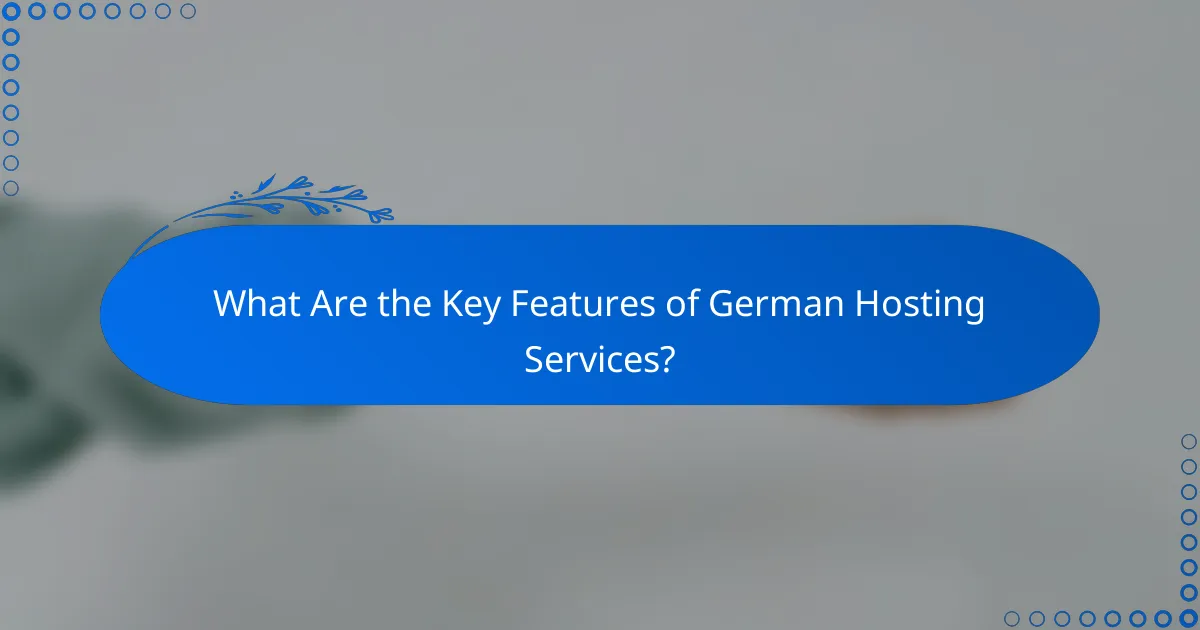
What Are the Key Features of German Hosting Services?
German hosting services stand out for their reliability, strict adherence to data protection laws, and flexible scalability options. These features enable businesses to operate efficiently while complying with local regulations, such as the GDPR, which governs data privacy across Europe.
Uptime guarantees are essential for any hosting service, directly impacting your website’s reliability. Many German providers offer uptime guarantees of 99.9% or higher, equating to less than 8.76 hours of downtime annually. This ensures users have consistent access to your site and reduces the risk of lost revenue.
Additionally, German hosting services often provide robust customer support, typically available 24/7. This constant assistance is vital for quickly resolving technical issues, maintaining a seamless online presence, and boosting customer satisfaction.
Uptime guarantees reflect a hosting provider’s commitment to keeping their servers operational for a specified percentage of time, with 99.9% being the industry standard. This reliability translates to just a few hours of downtime each year, crucial for businesses reliant on their online platforms for sales and customer engagement.
For example, with a 99.9% uptime promise, your website can expect to be down for no more than 8.76 hours each year. This reliability is especially critical for e-commerce businesses, where even minor disruptions can lead to significant financial losses and eroded customer trust.
Choosing a hosting provider with strong uptime guarantees can significantly impact your business’s reputation and revenue. Frequent outages can lead to lost customers and diminished brand credibility, making uptime a critical factor in your hosting decision.
Data protection compliance is a top priority for hosting services in Germany, largely due to the General Data Protection Regulation (GDPR), which imposes strict standards on the collection, storage, and processing of personal data. Non-compliance can result in substantial fines, making adherence vital for any business in the region.
German hosting providers typically ensure compliance through robust security measures, including advanced encryption and regular security audits. These practices protect sensitive information from breaches and unauthorized access, thereby enhancing data integrity.
By choosing a compliant hosting service, businesses not only meet legal obligations but also build trust with their customers, fostering loyalty and improving brand reputation, especially in a market that prioritizes data privacy.
Scalability options in hosting services are essential for businesses needing to adjust resources based on current demands. This flexibility is particularly important for growing companies that may face fluctuating traffic levels, especially during promotions or seasonal peaks.
For instance, many German hosting providers offer cloud hosting solutions that allow for easy scaling of resources like bandwidth and storage. This capability enables businesses to quickly boost their capacity during high-traffic periods without significant downtime, ensuring an uninterrupted user experience.
Implementing scalable hosting solutions can lead to considerable cost savings, as businesses are charged only for the resources they use. This approach promotes efficient budget management while ensuring optimal performance during peak traffic times, making it a strategic choice for forward-thinking companies.
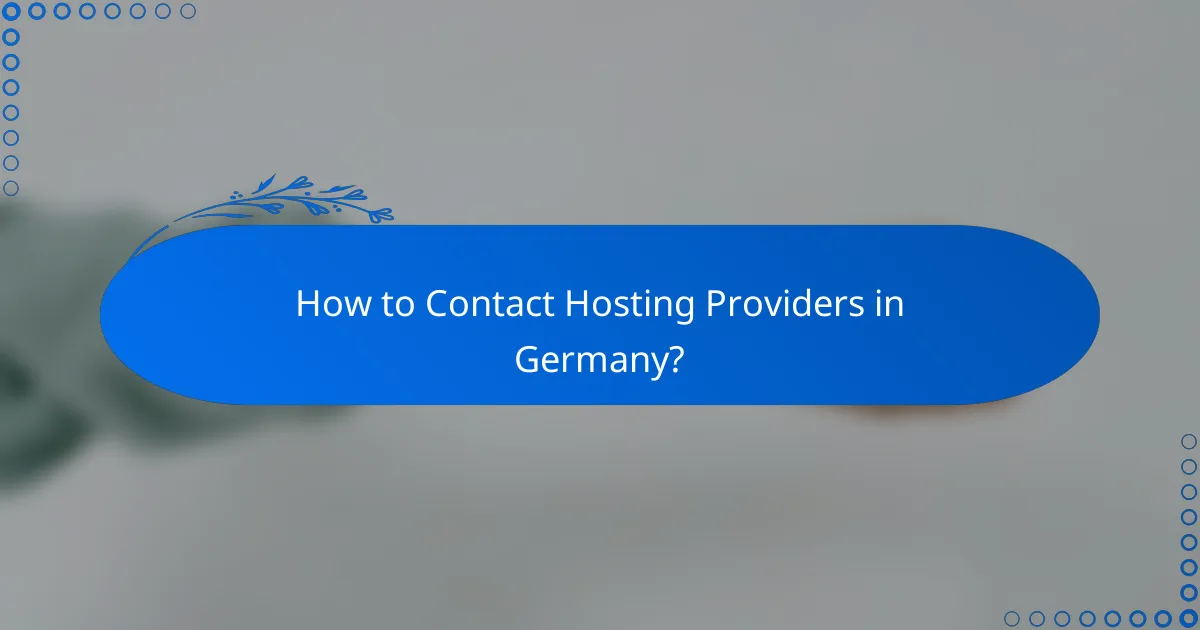
How to Contact Hosting Providers in Germany?
Contacting hosting providers in Germany can be simple if you know where to look. With over 1,000 companies in the market, most offer various ways to reach their support teams, ensuring timely assistance when you need it.
Email is a popular method for reaching out, with response times typically between a few hours and 24 hours. You can direct inquiries about services, pricing, or technical support to their customer service email addresses, usually displayed prominently on their websites.
Many hosting providers also feature live chat options on their websites, with studies indicating that 73% of customers prefer this method for its immediacy. This allows for real-time communication, making it easier to resolve issues or get quick answers without the delays of email.
Phone support is another effective way to contact hosting providers, as many companies offer toll-free numbers for convenience. Speaking directly with a representative can provide clarity and immediate assistance for urgent matters, especially during critical outages or technical difficulties.
Additionally, some companies have dedicated support portals for ticket submissions, complete with tracking systems that let you monitor the status of your inquiries in real time. This organized approach streamlines communication and ensures your requests are addressed efficiently.
Social media platforms are increasingly popular for customer support, with 67% of consumers seeking assistance this way. Many hosting providers maintain active profiles on platforms like Twitter and Facebook, allowing you to reach out for help or updates, often receiving faster responses than through traditional channels.
